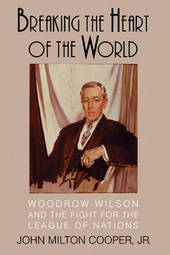
|
Breaking the Heart of the World: Woodrow Wilson and the Fight for the League of Nations
Hardback
Main Details
| Title |
Breaking the Heart of the World: Woodrow Wilson and the Fight for the League of Nations
|
| Authors and Contributors |
By (author) John Milton Cooper
|
| Physical Properties |
| Format:Hardback | | Pages:468 | | Dimensions(mm): Height 235,Width 160 |
|
| Category/Genre | World history - from c 1900 to now |
|---|
| ISBN/Barcode |
9780521807869
|
| Classifications | Dewey:973.913092 |
|---|
| Audience | | Professional & Vocational | |
|---|
|
Publishing Details |
| Publisher |
Cambridge University Press
|
| Imprint |
Cambridge University Press
|
| Publication Date |
24 September 2001 |
| Publication Country |
United Kingdom
|
Description
The fight over the League of Nations at the end of World War I was one of the great political debates in American history. President Woodrow Wilson, himself a key architect of the League, was uncompromising in his belief that the United States would rise to a position of leadership in the peaceful union of states that he had envisaged. A masterful politician and distinguished theorist, Wilson was unprepared for the persuasiveness of his opponents and the potency of their argument. Though he struggled tirelessly in the summer of 1919 to drum popular and political support for the League, he suffered a disabling stroke in July. The United States Senate ultimately rejected membership in the League, and the League failed to realize its diplomatic potential. In this engaging narrative, John Cooper relates the story of Wilson's battle for the League with sympathy, accuracy, and a deep understanding of the times.
Reviews'Cooper's analysis is acute, even-handed and remarkably free of the sentimentality (or scorn) that so often colors writing about Wilson.' Jeff Shesol, New York Times Book Review 'The book includes fascinating accounts of Wilson's stroke and recovery as well as colorful portraits of his principal enemies in the Senate.' Wisconsin State Journal 'A lucid and eminently readable account ... a work of substantial merit.' Washington Times
|